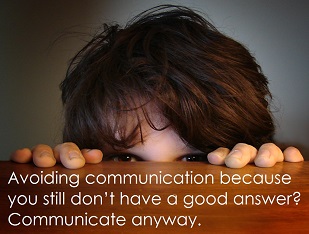This post is part of our Weekly Tips series.

Some of you know we moved to a new house this summer. We’ve been doing a bunch of renovations, yielding no shortage of lessons learned from interactions with contractors and suppliers. One such lesson—a surprising take on reliability—applies equally to the kind of people who read these tips.
Short version of the story: our new washer and dryer mysteriously went missing en route. They were either lost or stolen. It took over a month to get the situation resolved (never found, but replaced), and there were ripple effects—all annoying, none catastrophic.
The guy at the appliance store who had the fun job of sorting all this out, and communicating with me in the process, did OK with one exception.
A few weeks in, I got really frustrated. For one thing, I had never imagined we’d ever be a few weeks in—I had assumed the vendor would step forward and suck up the loss by ordering replacements much sooner than they did. I was also tired of being the one to reach out to get status. So, I asked nicely (I swear) for a brief update via email every day until the matter was resolved.
[Tweet “An unexpected #reliability lesson learned from interactions at the appliance store: #getreal #communication”]
I didn’t get a reply to that particular request for several days, during which time my frustration went from a Level 6 to a Level 9 (10 max). When he finally reached out, he said, “I didn’t want to write until I had a plan.”
I get it; I really do. Who wants to repeatedly communicate that you still don’t have a good answer? Dedicated problem-solvers hate this.
Dedicated trust-builders, however, know that requests from clients—especially the frustrated variety—should not fall on deaf ears. A counteroffer would have been OK. No response was not.
A plea: If your client specifically asks you for something, provide it if you can and say so if you can’t. If you’re troubleshooting a problem, and delays are likely causing emotions to escalate, choose to overcommunicate rather than avoid.
The solutions themselves aren’t the only way you add value.
Make It Real
This week, look for opportunities where what seems like overcommunicating might actually be of service, in and of itself.
Learn More

Read about a customer service showdown between the cable company and the DMV, from our friends at Trusted Advisor Associates, or brush up on reliability accelerators in Chapter 21 of The Trusted Advisor Fieldbook.
Andrea Howe
Latest posts by Andrea Howe (see all)
- A lesson from my own trust “fail” in my first-ever client meeting - April 15, 2024
- Why choosing silence in the face of awkwardness can be a trust tragedy - March 21, 2024
- What NOT to do when you think you’re being ghosted - February 21, 2024
